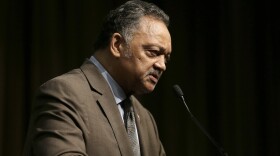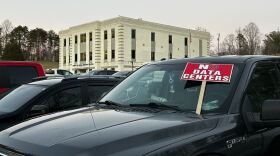On Wednesday at the U.S. Supreme Court, justices will hear arguments in a case out of North Carolina that could fundamentally transform federal elections in our country. The case was brought by Republican legislative leaders after the state Supreme Court redrew congressional districts it determined were so gerrymandered by the legislature, that they violated the state constitution.
Now Moore v. Harper will determine what role state courts can play in such redistricting matters. The case has captivated the attention of legal scholars and resulted in some sounding alarms about the future of election administration in America.
Here is a primer on Moore v. Harper and why it's so significant.
What is this case about?
In very basic terms — power, maintaining power, and congressional redistricting.
OK, a little more context, please?
It’s also about checks and balances. And in this case, a central question is if a state legislature draws congressional districts that are illegal, whether a state supreme court can step in and implement new maps? This is precisely what happened in North Carolina in February 2022. And the very thing North Carolina lawmakers want state courts to be prevented from doing in the future.
Is this really a big case?
Yup. The well-respected SCOTUS blog has called this an 800-pound gorilla.
And who filed this lawsuit?
Rebecca Harper, the named plaintiff, and 25 other North Carolina voters sued North Carolina House Speaker Tim Moore, the named defendant, after the General Assembly enacted new congressional districts in 2021.
Harper and the other plaintiffs argued that the new map should not be allowed to take effect because it violated numerous provisions of the state constitution. Initially, the state Supreme Court agreed, and the legislature was granted another chance to draw legal maps. After the legislature’s next set of lines didn’t pass muster, the court adopted a congressional map established by three court-appointed experts. The case, Moore v. Harper, is now on appeal before the U.S. Supreme Court.

Got it, and the legislature is arguing that state courts shouldn’t be able to stop them from enacting maps?
That’s correct. Republican lawmakers are using an old, and for a long time seldom referenced, provision from the U.S. Constitution to make their case. It’s called the Independent State Legislature Theory. The elections clause of the constitution reads:
"The Times, Places and Manner of holding Elections for Senators and Representatives, shall be prescribed in each State by the Legislature thereof; but the Congress may at any time by Law make or alter such Regulations, except as to the Places of chusing Senators."
Lawmakers are testing this theory. And MIT Political Science Professor Charles Stewart says the one element of the case amounts to a question of constitutional hardball.
“You know, pushing arguments to their limits, and avoiding norms that have grown up over the last century around the rules of democracy," says Stewart. "And I think it's a fact that Democrats have not been willing to play that hardball game yet, to the degree that Republicans have.”
So if North Carolina Republicans win, would there be no check, or balance, on Congressional redistricting?
Not exactly. In a brief with the court, Republicans addressed this very question and said that there are guardrails in place, including some challenges that could be made in federal court. Professor Stewart agrees there would be some guardrails, however, he has questions.
"The question is whose guardrails? And where? And what are the rules that they would be using? And what kind of guardrail is it?" asks Stewart. "There would still be federal law passed by Congress. There would still be the federal courts, there would still be the federal constitution. I think that's the argument being made by the legislators."
Stewart pushes back on one commonly presented argument.
"I don't think it's credible to make the argument that the U.S. Supreme Court is likely to hand down a decision which says that state legislators can do pretty much whatever they want to whenever they want to, in administering elections, including deciding who the winners are, I just don't think that's a plausible position."
And what are the plaintiffs saying?
Attorneys for the plaintiffs say this whole legal attempt is radical, dangerous, and holds the potential to upend congressional and presidential elections as we’ve known them. They are dismissive of the Independent State Legislature Theory on its face and are worried that a favorable ruling to Republican lawmakers will give them near unfettered power over congressional districts.
Additionally, the plaintiffs contend this kind of one-way street could allow legislatures even more autonomy over elections and issues ranging from photo identification requirements, to scheduling, to election processes, to — eventually — presidential electors. For their part, defendants have said the plaintiffs' arguments here are narrow in scope and have accused critics of fearmongering and overstating the argument at hand.







